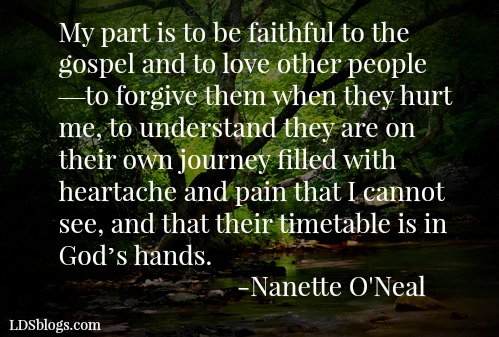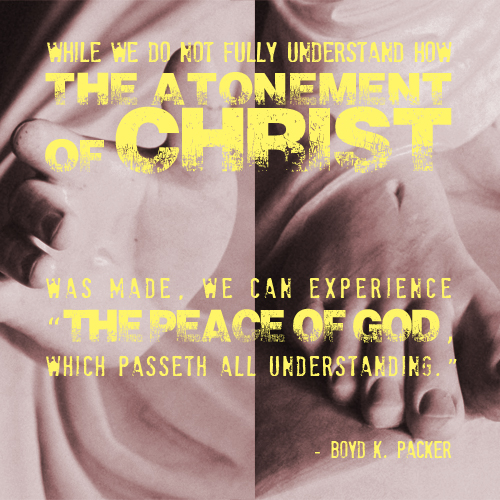I have the secret to eternal life and everlasting happiness. It is so simple to follow. All you have to do is read this book, ponder its message, pray about it with a sincere heart and with real intent, and Heavenly Father will testify to you that it’s true. Then if you align your life with His plan, He will continue to bless you in ways you can’t begin to imagine. You will always feel comfort and peace even during your trials. If you follow His commandments and endure to the end, you’ll have eternal life! Oh if it were only that simple for people to believe me. Why is it that their first reaction to a message like this is often to doubt its sincerity? Could it be that the cynical nature of mankind blinds the spirit of seeing the simplicity of the truth? There has to be a way to break through walls of doubt and fear so the message can be hear in its authenticity.
The tale of two bags of popcorn
 A friend of mine related this to a story of a boy on a park bench who wanted to feed a pigeon. He had a bag of popcorn in his hand. The pigeon pecked at the ground about six feet in front of him, but there was nothing there to eat. So the boy had an idea—he tossed the entire bag of popcorn at the pigeon. The popcorn littered the sky then scattered to the ground, but it also scared the pigeon away. The next day the boy returned with another bag of popcorn. The same pigeon was pecking at the ground near the same bench. The boy tried a different plan. He tossed one lonely kernel out to the pigeon instead of using the whole bag. The pigeon wasn’t frightened off. He bopped over to it and ate it. Then the boy did the same thing with another kernel, and another. Soon the pigeon seemed comfortable enough to get closer to the boy. After a while the boy had the pigeon eating right out of his hand. The obvious solution here was to gain trust by not overwhelming the pigeon with too much of a good thing at once. The same lesson can be taught with the gospel.
A friend of mine related this to a story of a boy on a park bench who wanted to feed a pigeon. He had a bag of popcorn in his hand. The pigeon pecked at the ground about six feet in front of him, but there was nothing there to eat. So the boy had an idea—he tossed the entire bag of popcorn at the pigeon. The popcorn littered the sky then scattered to the ground, but it also scared the pigeon away. The next day the boy returned with another bag of popcorn. The same pigeon was pecking at the ground near the same bench. The boy tried a different plan. He tossed one lonely kernel out to the pigeon instead of using the whole bag. The pigeon wasn’t frightened off. He bopped over to it and ate it. Then the boy did the same thing with another kernel, and another. Soon the pigeon seemed comfortable enough to get closer to the boy. After a while the boy had the pigeon eating right out of his hand. The obvious solution here was to gain trust by not overwhelming the pigeon with too much of a good thing at once. The same lesson can be taught with the gospel.
The tale of two missionaries
 In the Book of Mormon, two friends set out to teach the people in neighboring towns about the gospel. Ammon and Aaron went their separate ways and had completely differing experiences. They both went to areas known to be hostile to the gospel and to people of their heritage. Ammon’s plan was to surrender himself to the king and make himself a servant in this land—one that was filled with the spirit of the Lord and who could be an example to the people of goodness and strength through the Lord. He worked for the king to save his flocks from predators. His acts of bravery softened the hearts of the people to the point where even the king was convinced of his goodness. Eventually the entire kingdom was converted to the gospel. Aaron, on the other hand, fell on a more hard-hearted lot of people. When he tried to preach the gospel he was immediately thrown in prison and left to suffer. Eventually Ammon and the converted king were able to come to his rescue, and the people who imprisoned Aaron listened to the testimony of the king who Ammon had once served.
In the Book of Mormon, two friends set out to teach the people in neighboring towns about the gospel. Ammon and Aaron went their separate ways and had completely differing experiences. They both went to areas known to be hostile to the gospel and to people of their heritage. Ammon’s plan was to surrender himself to the king and make himself a servant in this land—one that was filled with the spirit of the Lord and who could be an example to the people of goodness and strength through the Lord. He worked for the king to save his flocks from predators. His acts of bravery softened the hearts of the people to the point where even the king was convinced of his goodness. Eventually the entire kingdom was converted to the gospel. Aaron, on the other hand, fell on a more hard-hearted lot of people. When he tried to preach the gospel he was immediately thrown in prison and left to suffer. Eventually Ammon and the converted king were able to come to his rescue, and the people who imprisoned Aaron listened to the testimony of the king who Ammon had once served.
The difference is the intent of the messenger
Both Ammon and Aaron had a popcorn-style approach in delivering their message of salvation. They were both excited about the truth. While we don’t know for sure how much of a message Aaron was able to preach, we do know he tried. We also know his message was immediately rejected. But Ammon had a different methodology. He may have realized the overwhelming nature of his message to a people who had been living their lives so far from it; they would not recognize it for its truth. Instead of starting with the message he started with his relationship with the people. He set a foundation of trust and allowed the people to approach him in their own time and in their own way. His method took longer, but it proved to be the more effective one.
 I have seen the effects of my own popcorn-approach to spreading the word. As a new convert, I first wanted to throw the message out to everyone and let it land on them like falling rain. I wanted to drench them with the things I had learned, allow them the chance to feel what I felt and become part of the great plan of happiness set by our Father in Heaven. I’d been so enthusiastic over its truthfulness to the point where family members who were not ready to hear the truth immediately threw me in a spiritual prison—casting me out of their family circle. Like Aaron, all I had to do was mention the restoration, and the conversation was over before it ever began. But I’ve also experienced what Ammon went through. I’ve seen the effects of loving family and friends first, allowing them to come to the gospel on their own time. My husband is not a member, but over time his heart has softened to the gospel. He loves the people. He is building a testimony in his own time frame, the way our Heavenly Father expects him to.
I have seen the effects of my own popcorn-approach to spreading the word. As a new convert, I first wanted to throw the message out to everyone and let it land on them like falling rain. I wanted to drench them with the things I had learned, allow them the chance to feel what I felt and become part of the great plan of happiness set by our Father in Heaven. I’d been so enthusiastic over its truthfulness to the point where family members who were not ready to hear the truth immediately threw me in a spiritual prison—casting me out of their family circle. Like Aaron, all I had to do was mention the restoration, and the conversation was over before it ever began. But I’ve also experienced what Ammon went through. I’ve seen the effects of loving family and friends first, allowing them to come to the gospel on their own time. My husband is not a member, but over time his heart has softened to the gospel. He loves the people. He is building a testimony in his own time frame, the way our Heavenly Father expects him to.
A simple solution—love for love’s sake
The gospel message is pure in its simplicity—so too is the solution to how one should deliver the message. Our Father in Heaven shows us the answer in the way he approaches us. He loves us for love’s sake. People are different from each other. People have different backgrounds. We all have baggage others cannot see. We learn and progress at different rates. We manage our blessings and trials in differing ways. But we have one thing in common—we are on a journey back to a Father in Heaven who loves us no matter where we are on the spiritual staircase to heaven. Love—a pure love like the one our Father in Heaven has for us—is the answer as to how to approach others with differing views of salvation.
Moses and the brass serpent
Can it really be that simple? Love one another as Heavenly Father loves you? We know in the Old Testament of the story of Moses and the Israelites in the wilderness. When they were tormented by the fiery serpents, Moses was commanded by God to craft a brass serpent and to mount it on a pole. If the people looked up at the brass serpent, they would be healed—it was that simple. I wonder how many of them looked immediately and how many may have doubted the simplicity of the solution, thinking it couldn’t be that easy. We too are given a simple solution. It only feels difficult when we let doubt and fear get in the way of seeing the truth.
Let your Light so Shine
“Ye are the light of the world. Let your light so shine before men, that they may see your good works, and glorify your Father which is in heaven.” (Matthew 5:14, 16)
My part is to be faithful to the gospel and to love other people—to forgive them when they hurt me, to understand they are on their own journey filled with heartache and pain that I cannot see, and that their timetable is in God’s hands. I have Christ as an example of pure love to model my own behavior after, and that is a blessing that will last a lifetime. Knowing all this actually lightens my load considerably. I am not responsible for the actions of others—I am only responsible for myself. If I can be the best “me” there is, I will be doing my part. If I can shine with the countenance of the Savior, others will see the gospel message in all its splendor and they will glorify God in heaven—when the time is right for them.
About Nanette ONeal
Nanette O'Neal loves the gospel and is very happy to share her testimony on LDS Blogs. She is a convert to the church and still feels the spirit burn strong within her heart. She graduated from Mason Gross School of the Arts with a degree in music education and has taught children and adults in the private and public sphere for over twenty years. Nanette continues to study the gospel and the art of writing. She writes weekly inspirational articles on her blog and is currently working on an LDS fantasy novel series, A Doorway Back to Forever. You can find her at NanetteONeal.blogspot.com. Nanette has a wonderful husband, talented son, and three beautiful dogs.







